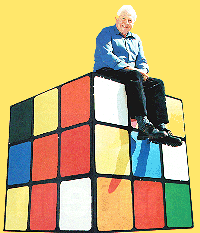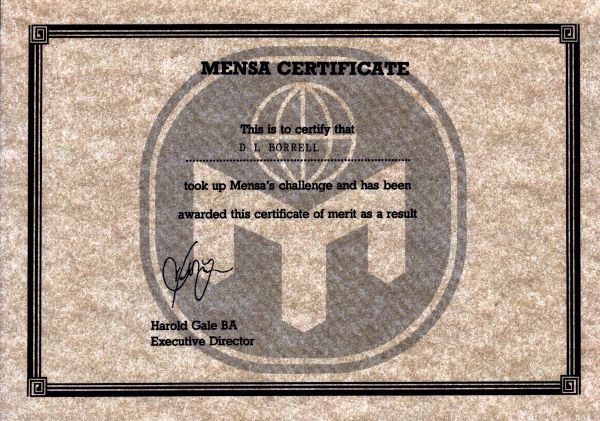 |
| WAV 177K |
Marcel Berlins is not the easiest man to keep up with.
Always boyishly animated, one moment he displays all the logical organisation
to be expected of a former legal correspondent
of The Times who has presented Radio 4's Law in Action for
the past 12 years. Seconds later, his eyes light up and he's hack in a secret
world of mind-blowing mystery.
By his own admission, Berlins is far more interested in the ingenuity of
the puzzle than he is in solving it. And a lifetime's addiction is about
to come bubbling to the surface as he embarks on the first installment of
a five-part Radio 4 series, Puzzling Passions. Before his odyssey
is over, the French-born, South Africa-trained lawyer
will have delved into such fiendish devices as the labyrinth of Greek
mythology where the Minotaur was held and the ancient Egyptian maze that
had one passage for men and, beneath it, another for crocodiles. He will
ponder mathematical puzzle. ("Did you know that it was only in the 15th century
that the Arabs invented the concept of zero [Ref: Audio MEMOREXc9022A
{Square on the Pythagoras};TDKc9055B{Nothing}],which gave rise to a whole
new range of puzzles?"), enter into the minds of cryptic crossword setters
and take an addict's eye view of the Rubik cube - and the schoolboy who a
wrote a book on how to solve it.
He'll also recall the treasure hunt for a buried golden statue of a hare
which turned the launch of Kit Williams's book, Masquerade into a
national obsession, not to mention Edwardian crime writer E Phillips Oppenheim
- known as "the king of the railway timetable" because of the accuracy with
which he constructed clues and problems out of its details.
"Puzzles are not particularly confined to any one culture or gender - although
the cryptic crossword is essentially an Anglo-Saxon pastime - but what they
all have in common is the urge of one person, the puzzle-maker, to outwit
his victim and the responder's wish to find a way through to the mind of
the maker and to solve it," says Berlins, clearly warming to his theme. "I've
always been keen on crime books and review them as a freelance.John Dickson
Carr's books I particularly enjoyed. His detective stories [such as The
Curse of the Bronze Lamp and The Hollow Man] are very
puzzle-orientated, specialising in sleight of hand and the art of omission.
The answer is nearly always to do with the reader being diverted into
missing what should have been obvious. But in
the end you have to admit that everything is there to enable you to work
it out for yourself"
Just as everything necessary is invariably present in the devilish quiz with
which Berlins confronts readers of The Guardian every Saturday.
Unfortunately, that doesn't make them any easier for mere mortals to solve.
Try this recent example for size. What links: a) Tokyo; b) a literary
nightingale; c) the predecessor of a drop of golden sun and d) a dictionary.
Give up? The common denominator is, of course, an anagram. The answers: a)
Tokyo was formerly called Edo; b) Keats's Ode to a Nightingale; c)
"Doe, a deer, a female deer, ray, a drop of golden sun" (from The Sound
of Music); and OED, as in Oxford English Dictionary.
 "Puzzling used
to be confined to people who thought they were quite clever but nowadays
it has little to do with intelligence and not much to do with knowledge either,"
he insists, with a modesty that is only just credible. "All you need is some
quirky thing which isn't quite right in the brain that allows you to see
something that other people can't." William Greaves
"Puzzling used
to be confined to people who thought they were quite clever but nowadays
it has little to do with intelligence and not much to do with knowledge either,"
he insists, with a modesty that is only just credible. "All you need is some
quirky thing which isn't quite right in the brain that allows you to see
something that other people can't." William Greaves
"For two years,I lived in the secret world of codes and codebreakers.
My fascination of the subject began with my love of
puzzles.Secret codes are where puzzles
meet politics,deciding the outcome of battles,and toppling governments.The
story of codes is all about an intellectual arms race,that has culminated
in sophisticated science,involving esoteric maths, satellites and
supercomputers."
"Code breaking was the ultimate puzzle and puzzles were something Babbage
felt compelled to solve."- Simon
Singh in "The Science
of Secrecy" (Author of
Fermat's Last Theorem,
The Code
Book,The Science of Secrecy
)
Having lobbed in his bombshell, he
seems to have decided to sit on the sidelines, enjoying the ensuing chaos.
"What I have come up with is an intriguing puzzle," he says. "I want people
to think."- Humphrey Maris (The man who dropped a bombshell on Quantum
Field Theory)
"Yes,I would say..I consider it as a puzzle and everybody tries to get
a little piece of the puzzle and get that right and then put it together
with say John (Fry)'s piece of puzzle, you know, and we try to put the picture."
- Rolf Landau, Physcist, speaking on antimatter
and the asymmetry of the universe.
 My comment: I find it absolutely
astonishing that a presenter of a Radio 4 Programme,an Ex-lawyer knows nothing
about the history of mathematics or why puzzles arise or who creates them.
The astonishing ignorance Mr Berlins displays of his chosen subject indicates
either a complete lack of research or his overlooking of a massive
sphere of human endeavor.As Simon Singh correctly says puzzles have been
at the heart of many serious and deeply reflective problems for mankind.Far
from being pointless and having no impact on human life,the complete reverse
is true as Simon Singh shows in his book on the solving of Fermat's
Last Theorem by
Andrew Wiles.
What Marcel's fascination displays is a curious view of mathematics,that
of the uninformed layperson,wondering from whence all these wonders arise,it's
from mathematics Mr Berlins,something you obviously know nothing about. Solutions
to MENSA puzzles are often childishly simple once
one knows the generic formula for the case at hand.I know that if I
am ever in the dock I will make sure that no lawyer of Marcel's abilities
is taken on to defend me.Such chronic ignorance should have been ended at
high school,or University. Perhaps Marcel was one of those who said
"I'll never need mathematics when I grow up".Puzzles and enigmas are
what created superstitious and magical symbolism from mathematics.The by
product of serious mathematical investigation can be a game,as in
Roger Penrose's tiles, which are use in his books
as a way of showing how consciousness works, but also gave rise to
a game.THIS
is how it happens Marcel,didn't you know? What puzzles me is how Mr Berlins
came to host this programme when he clearly doesn't know what he's talking
about.
My comment: I find it absolutely
astonishing that a presenter of a Radio 4 Programme,an Ex-lawyer knows nothing
about the history of mathematics or why puzzles arise or who creates them.
The astonishing ignorance Mr Berlins displays of his chosen subject indicates
either a complete lack of research or his overlooking of a massive
sphere of human endeavor.As Simon Singh correctly says puzzles have been
at the heart of many serious and deeply reflective problems for mankind.Far
from being pointless and having no impact on human life,the complete reverse
is true as Simon Singh shows in his book on the solving of Fermat's
Last Theorem by
Andrew Wiles.
What Marcel's fascination displays is a curious view of mathematics,that
of the uninformed layperson,wondering from whence all these wonders arise,it's
from mathematics Mr Berlins,something you obviously know nothing about. Solutions
to MENSA puzzles are often childishly simple once
one knows the generic formula for the case at hand.I know that if I
am ever in the dock I will make sure that no lawyer of Marcel's abilities
is taken on to defend me.Such chronic ignorance should have been ended at
high school,or University. Perhaps Marcel was one of those who said
"I'll never need mathematics when I grow up".Puzzles and enigmas are
what created superstitious and magical symbolism from mathematics.The by
product of serious mathematical investigation can be a game,as in
Roger Penrose's tiles, which are use in his books
as a way of showing how consciousness works, but also gave rise to
a game.THIS
is how it happens Marcel,didn't you know? What puzzles me is how Mr Berlins
came to host this programme when he clearly doesn't know what he's talking
about.
His second comment above displays that revulsion of mathematics and the ignorance
of why it is done and why a formulae is a better methodology.The process
of generalising is what cracks all forms of the same puzzle.Note that the
formula he quotes is NOT even a real formula,because he doesn't know how
to create a real one. Marcel seems to be one of those of the other of the
Two Cultures who haughtily
and snootily dismiss what they don't understand as being irrelevant or in
some demeaning the challenge to the human mind,when in fact his way is the
lazy unchallenging way.As John Maddox recounts
and Carol Vorderman ,there seems to be a group of
people for whom this subject is a constant mystery and as Marcel himself
said in his programme if one does not catch on to maths early the whole notion
becomes a foreign land that is populated by seeming masters of esoterica
that the layperson looks upon with scorn, derision,jealousy and sour
grapes.
One would have thought that solving puzzles was very much applicable to the
law,which presumably we should take to be something whose solutions have
an impact on wider spheres of life.Given Mr Berlins view,the process of law
as the solution to a puzzle is a waste of time,perhaps this is why so many
feel cheated in court by lawyers who don't seem to give a damn about the
outcome,but then the pointlessness is the whole point according to Marcel.Try
telling that to those laypersons finding themselves at the hands of the process
of law.Perhaps Marcel's derision stems from Louis Blom-Cooper's (much noticed)
observation in "The Commission-6"that science deals
with probability and the law needs certainty, and lawyers like politicians,wonder
why it is science can never deliver a "verdict".Stephen
Jay Gould takes up this difference which he calls a "puzzle of
discipline",perhaps Marcel thinks the whole of moral philosophy is waste
of time too,and echoes Popper's
view of falsification rather than validation,where
Kuhn thought that science changed by paradigm shift (personally I side with
Kuhn).
Maybe next time Mr Berlins presents Law in INaction,he could address
these points,I'd listen in,but one might easily dismiss the pontifications
of an uninformed ex-lawyer as having no impact on the wider spheres of human
life,and I wouldn't wish to waste my time.
| Chaos | Quantum | Logic | Cosmos | Conscious | Belief | Elect. | Art | Chem. | Maths |